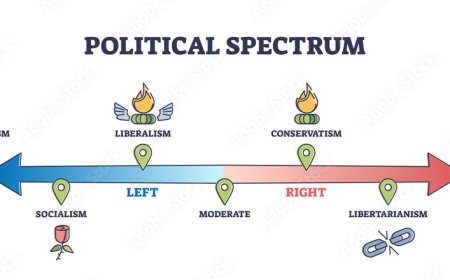Why Should You Be a Libertarian?
Discover the core principles and benefits of adopting Libertarianism. Explore how this political philosophy promotes individual freedom, limited government, and personal responsibility, and understand why it might be the right choice for you. Read on to see how Libertarian values can align with your vision for a more liberated society.

Introduction
Have you ever felt the urge to break free from the constraints of traditional political ideologies? Welcome to the world of libertarianism, where the individual reigns supreme, and freedom is the guiding principle. In this fast-paced world, political ideologies shape our lives in profound ways. Understanding libertarianism might just offer the fresh perspective you need.

Understanding Libertarianism
So, what exactly is libertarianism? At its core, libertarianism champions individual liberty, minimal government interference, and free markets. Unlike conservatism or liberalism, libertarianism values personal freedom above all, believing that individuals are best equipped to make their own decisions.
Core Principles of Libertarianism
Personal Freedom
Libertarians emphasize personal freedom, advocating for your right to live as you choose, provided you don’t infringe on others' rights. This includes freedom of speech, religious beliefs, and lifestyle choices, all of which are protected under libertarianism.
Economic Freedom
In economic matters, libertarians support free markets. They argue that minimal government intervention allows for the most efficient allocation of resources. By letting individuals and businesses determine production, distribution, and pricing, libertarianism fosters competition, innovation, and prosperity.
Limited Government
Libertarianism advocates for a smaller government that focuses on protecting individual rights rather than controlling personal lives. This approach leads to reduced bureaucracy, lower taxes, and more personal autonomy.
Personal Responsibility
Libertarians stress personal responsibility, encouraging individuals to take ownership of their actions and their consequences. This ethos promotes self-reliance and accountability, leading to a more empowered and proactive society.
Non-Aggression Principle
Central to libertarianism is the non-aggression principle: the belief that force is only justified in self-defense. This principle promotes peace and reduces unnecessary conflicts, both domestically and internationally.
Civil Liberties
Libertarians are strong defenders of civil liberties, opposing surveillance, censorship, and any infringement on personal freedoms. This commitment ensures that individuals can live without fear of government intrusion into their private lives.
Social Tolerance
Libertarianism fosters a society of tolerance, accepting diverse lifestyles and opinions. By promoting mutual respect and understanding, libertarianism contributes to a more harmonious and inclusive community.
Innovation and Progress
Libertarianism encourages innovation by supporting a free market where ideas can thrive. With fewer regulations, entrepreneurs and inventors can pursue their visions, leading to technological advancements and economic growth. History shows that less regulation often spurs innovation, from the tech industry to the gig economy.
Case Study: Libertarianism in Practice
Consider regions with libertarian-leaning policies, such as Hong Kong and Singapore. Despite their small size, these areas have thrived economically due to their commitment to free markets and limited government intervention. Their success stories serve as compelling evidence of libertarianism's potential.
Addressing Common Misconceptions
Libertarianism often faces misconceptions, such as being a call for anarchy or only benefiting the wealthy. In reality, libertarianism advocates for a well-ordered society where individuals are free yet responsible. It’s about empowering everyone by removing unnecessary barriers to success.
Why Libertarianism is Relevant Today
In a world with increasing government overreach and dwindling personal freedoms, libertarianism offers a beacon of hope. In India, where bureaucracy and regulation often stifle innovation and personal freedom, adopting libertarian principles could unleash significant potential and foster a more prosperous and free society.
Conclusion

Libertarianism is more than just a political ideology; it's a way of life that prioritizes freedom, responsibility, and innovation. By embracing libertarian principles, you can help create a society where individuals are free to pursue their dreams, speak their minds, and live their lives without unnecessary government interference. Isn't it time to consider a fresh perspective?
FAQs
1. What is the core belief of libertarianism? Libertarianism believes in maximizing individual freedom and minimizing government intervention in personal and economic matters.
2. How does libertarianism differ from other ideologies? Unlike conservatism and liberalism, libertarianism advocates for minimal government control in all aspects of life, focusing on individual autonomy and free markets.
3. Can libertarianism work in India? Yes, by reducing bureaucratic red tape and promoting personal and economic freedoms, libertarianism can help unleash India's vast potential.
4. What are the benefits of a smaller government? A smaller government reduces bureaucracy, lowers taxes, and allows for greater personal and economic freedom.
5. How does libertarianism promote innovation? By fostering a free market without heavy regulation, libertarianism encourages entrepreneurship and the pursuit of new ideas, leading to technological and economic progress.
What's Your Reaction?



















































